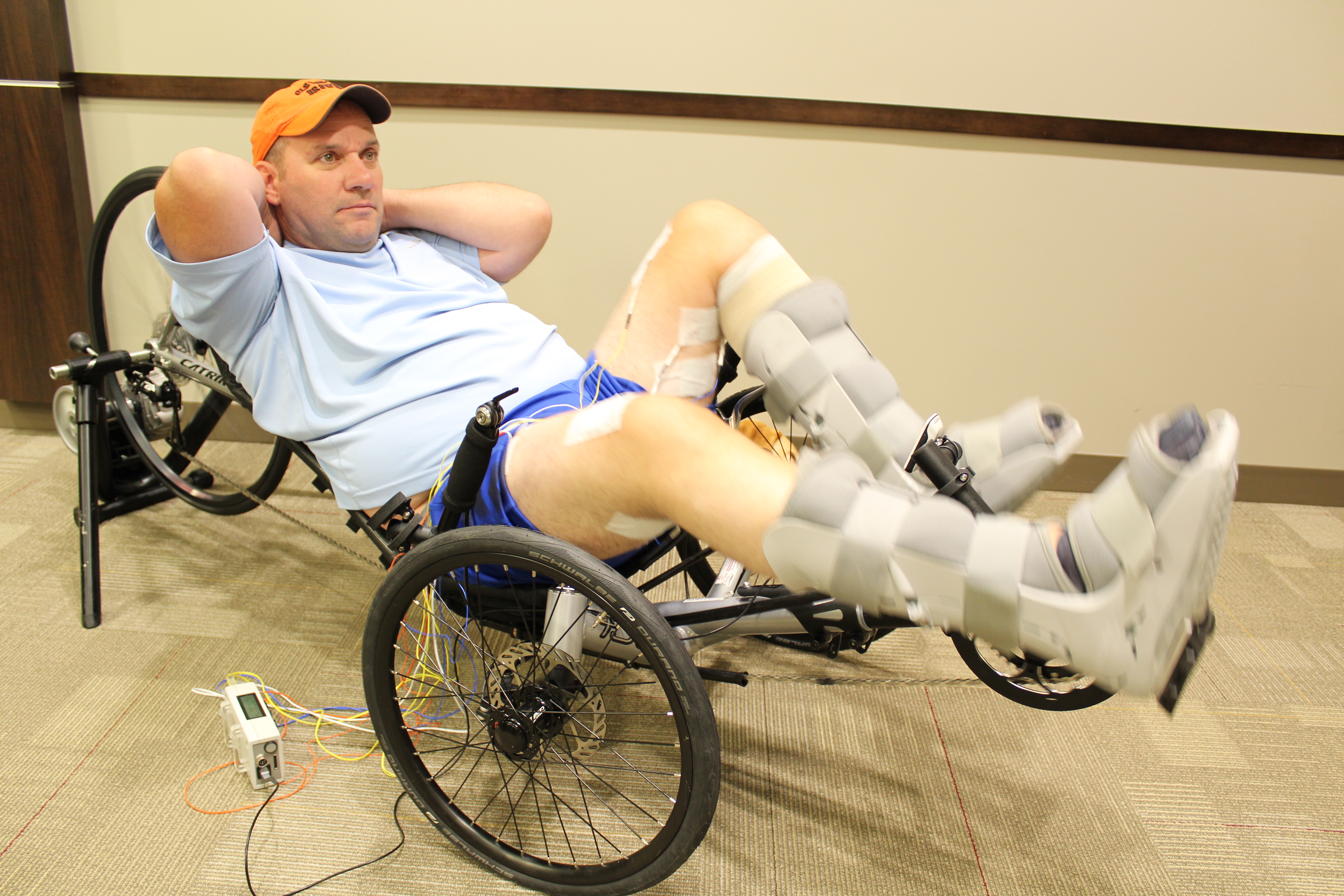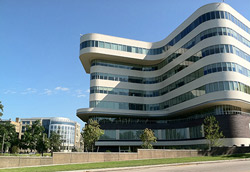About the APT Center
APT Center Annual Report Summary

2019 Key Impacts
- VETERANS OUTREACH: Improving quality of life one Veteran at a time.
- ARCHITECTURAL ACCESS FOR VETERANS: Leveling the world with the press of a button.
- EXERCISE FOR PARALYZED VETERANS: Improving the health through biking and rowing (above).
- MOBILITY FOR VETERANS WITH SCI: Exoskeletal-Assisted Walking.
- TREATING INCONTINENCE: Addressing a major concern of aging or paralyzed Veterans.
- SENSATION FOR VETERANS WITH LIMB LOSS: Prosthetic hands and feet that feel.
2019 Key Services
- APTC Investigators organize IEEE BioCAS conference & NeuroCAS workshop.
- APTC engages LSCVAMC in workshop for nonprofit RePlay for Kids.
- APTC participates in outreach and education activities in the community.
- New appointments for APTC Investigators.
- APTC participates in the VA RR&D Roadshow at AOPA in San Diego.
- APTC Summer Internship Program yields productive outcomes for interns and mentors.
- APTC helps senior leadership understand the translational value of pre-clinical research to Veterans.
- Core Investigators contribute to journals and conferences in varying roles.
- Core Investigators serve on grant review panels.
2019 Annual Report Narrative Summary
2018 Annual Report Narrative Summary
2017 Annual Report Narrative Summary
2016 Annual Report Narrative Summary

APT Center Family
Personnel associated with the Center include more than 50 investigators, plus engineers, clinical staff, trainees, and support specialists in regulatory affairs, quality systems, communications, tech transfer, and research administration. These individuals have successfully secured external scientific, developmental, and translational research funding from private and public sources, including local and federal granting agencies and industrial partners. For fiscal year 2019, our active (yearly) portfolio is valued to be in excess of $16 million.
Investigators with the Center include multiple recipients of prestigious Presidential Early Career Awards for Scientists and Engineers (PECASE) and the NIH Director’s Innovation Award, inductees of the American Institute of Medical and Biological Engineering (AIMBE), and VA Career or Senior Career Research Scientist awardees. Clinician-researchers associated with the Center include some of the "Best Doctors in America" as named by Cleveland Magazine and Best Doctors, Inc.
From 2015-2019, APT Investigators generated 123 invention disclosures and 72 provisional patent applications, and were issued 37 full utility patents. They have also produced innumerable peer-reviewed articles and graced the covers of Science Translational Medicine, American Journal of Physical Medicine and Rehabilitation, and IEEE Spectrum, and have been invited speakers at national and international conferences.
Since our third competitive renewal in 2015, we have worked to implement new strategies to enhance communication, create opportunities for professional growth, expand our technical capabilities, and actively seek out and nurture new industrial interactions.
Sampling of APT Center Capabilities
- Circuit and software design - Digital and analog simulation and other development tools are available for integrated circuit layout, fabrication, and testing, as well as creation and verification of new software systems.
- Neural interfacing - We have more than 40 combined years of experience with devices that bridge the gap between neurobiology and engineering. We have the facilities, tools, and know-how to help design, develop, and test systems that communicate with and transfer to and from the peripheral or central nervous systems.
- Polymer and bioactive material development - New materials can be engineered on the molecular level to mimic biological functions or designed to interact and live with living tissue and biologic systems.
- Rapid prototyping - Computer controlled machining, 3D printing and additive manufacturing, and other processes reduce design to fabrication time.
- System validation and design control - We develop devices based on industry standard design controls.
- Professional engineering support and project management
- Administrative support for intellectual property protection, regulatory affairs, and grant and contract management.
Sampling of APT Center Technologies
- Biosignal acquisition and processing, including emerging new technologies for electromyography (EMG), electroencephalography (EEG) and electroneurography (ENG)
- Implantable sensing, recording, stimulating, and communication devices
- Pressure, volume, acceleration, and other physical or chemical sensors
- Portable computer controlled systems for surface and percutaneous stimulation
- Stimulating and recording electrodes
APT Center Research Sites
The APT Center is located on the premises of the Louis Stokes Cleveland VA Medical Center and operates in partnership with Case Western Reserve University Schools of Engineering and Medicine. In addition, our investigators collaborate with clinicians and researchers located at University Hospitals Cleveland Medical Center, MetroHealth Medical Center, Cleveland Clinic Foundation, and numerous other institutions nationally.
The Center capitalizes on significant local expertise in the areas of microelectronics, micro/nanofabrication, and materials science and mechanics to address unmet needs of disabled Veterans and the broader rehabilitation community.




















